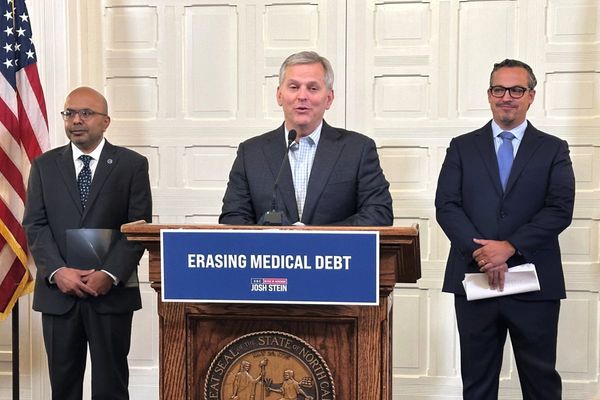Investors have been known to turn to health care to buttress beleaguered portfolios, a common tactic during economic downturns. But with a controversial figure in charge of U.S. health policies and the looming impact of a trade war on the biopharma industry, are medical stocks truly a safe haven?
Portfolio managers say yes.
Medical stocks tend to outperform during recessions because health care benefits from inelastic demand. Whatever happens with the economy, people still need to see doctors, undergo medical procedures and take their medicine.
But not all medical stocks are equal. Some will have a steeper exposure to tariffs. Others could struggle to navigate funding cuts at the National Institutes of Health and the Centers for Disease Control and Prevention. Changes in Food and Drug Administration animal testing requirements could undermine some lab equipment companies.
Still, Shams Afzal, managing director at Carnegie Investment Counsel, an investment strategies firm, expects medical stocks to eventually benefit from a "flight to safety."
"Obviously, there has been no shortage of that knee-jerk reaction towards flight to safety," he told Investor's Business Daily. "That part doesn't surprise us. But the way we have sort of played the health care game at least for the post-Covid years has to be overweight on medtech and be underweight on pharmaceuticals. And that has served us well."
Which Medical Stocks Will Outperform?
Medical stocks have generally performed in line with the broader market given all the uncertainty.
Some segments have taken bigger beatings than others, however.
IBD's Medical-Biomed/Biotech industry group has fallen by double digits this year, underperforming the Dow Jones Industrial Average, the S&P 500 and the Nasdaq composite Index.
Biotech stocks are taking a beating thanks to a massive upheaval at the Department of Health and Human Services. Some 10,000 employees lost their jobs in a matter of two days this spring. New FDA Commissioner Marty Makary has tried to assuage worries that drug approvals would slow.
"They say that drugs will be approved on their merits and the people being let go will not have any impact on the timeliness of worthwhile drugs that need to be commercialized," Afzal said. "I cannot imagine if you're letting go of over 10,000 people that you're somehow not going to miss a step."
The pharma segment has also skidded with the Medical-Ethical Drugs industry group down a low-single-digit percentage.
Biopharma-Specific Headwinds
Drug stocks are facing headwinds that won't impact other medical stocks.
President Donald Trump recently signed an executive order to lower drug prices. Pharmaceutical companies have been told to brace for a Most Favored Nations, or MFN, approach to drug pricing in the U.S. This approach would tie the prices of drugs in the country to an international index, according to a Reuters report. U.S. drug prices are about three times higher than drug prices in other developed countries.
"This is, on one hand, a somewhat sudden reemergence, given MFN rhetoric had been conspicuously absent from the President's 2024 campaign and recent executive order," RBC Capital Markets analyst Brian Abrahams said in a report. "On the other hand, (it's) not altogether surprising given the administration's recent economic push towards 'America First' policies."
Further, while medical devices are contending with the broad 10% tariff and the potential for reciprocal tariffs, they won't be sidelined by a tariff on drug imports. Leonid Timashev, an RBC analyst, says tariffs will have an immaterial effect on companies across the large biopharma space.
But "other factors — such as the current volatile drug regulatory environment, tighter Medicaid/Medicare budgets — could negatively impact the sector and undermine its ability to be defensive," he said in a recent report.
Pharma executives aren't keeping their concerns quiet.
Johnson & Johnson Chief Executive Joaquin Duato recently said tariffs could broadly impact supply chains, which could lead to potential shortages and increased costs. Eli Lilly CEO David Ricks told the BBC that tariffs "will be hard to come back from" and predicted companies would cut into their research and development costs to offset their impact.
These Medical Stocks Look Promising
Jeff Jonas, a portfolio manager with Gabelli Funds, says medical devices are looking better and better. He notes that utilization is running high, evidenced by United Healthcare's first-quarter report. Though shares of the insurer took a beating after missing earnings views and slashing its guidance, the company said health care utilization is on the rise, especially among retirees.
"People are worried about losing their health insurance; they kind of rush out to get a lot of things done that they might have been deferring or postponing," he told IBD. "Worst case, if you do lose your job but you need that hip or knee replacement and a month or two of rehab afterwards, that might be the better time to go get it done."
Stocks in the Medical-Products industry group, though, collectively have fallen less than 10% this year. Research/equipment stocks are down by double digits while shares of systems/equipment companies have tumbled by a high-single-digit percentage. They face their own setbacks.
After NIH funding cuts, numerous companies and institutions will have to turn to new sources of capital to afford preclinical and clinical testing. And capital isn't cheap right now. That's putting pressure on contract resource organizations like Iqvia and Medpace Holdings, which help companies run clinical testing to win FDA approval for drugs and devices.
Meanwhile, the FDA's decision to phase out animal testing for monoclonal antibodies and other drugs is weighing on companies like Charles River Laboratories, which provides the animals for testing. The medical stock plummeted more than 28% on April 10 after the FDA announced its phaseout decision.
Intuitive Surgical, which belongs to the Medical-Systems/Equipment industry group, recently said the impact of additional tariffs "could be material" for its 2025 financials.
Tariffs Have Less Impact On Devices
But when tariffs come into play, medical device stocks mostly should outperform, experts say.
Carnegie's Afzal likes Stryker and Steris. Stryker is famously known for its orthopedics division, which makes hip and knee replacements. Steris provides sterilization services for the lab sciences industry. Afzal estimates that just 2.5% of Stryker's revenue comes from Mexico and Canada, while just 10% of Steris' sales stem from abroad.
Jennie Tsai, another portfolio manager at Gabelli, said in a recent report that most orthopedic companies make their implants and other products in the U.S. The few companies with facilities in Mexico and Canada are expected to be exempt from tariffs under the U.S.-Mexico-Canada trade agreement.
Gabelli's Jonas and other analysts like Abbott Laboratories. Abbott is a major health care conglomerate. Nearly half of its sales, 47%, come from medical devices like its continuous glucose monitor for diabetes, FreeStyle Libre. Diagnostics tools makes up about 20%. The balance comes from nutrition and drugs, with the latter selling outside the U.S. only.
Abbott recently said it faces about $700 million in annualized medtech tariffs, trailing $1 billion to $1.5 billion from Dow Jones medical stock J&J, according to BofA Securities analyst Travis Steed. Abbott sounds confident it can offset much of the tariff impact. It doesn't expect any impact until 2026.
But Abbott is also one the least exposed medical stocks when it comes to tariffs.
"We had thought medtech was more immune and did not estimate that in our tariff model," he said. "Instead, U.S. to China has been a big piece of the tariff headwind and the biggest delta between our tariff model and the actual impacts."
Medical Stocks Usually Rise After Elections
Ultimately, it's not unusual for medical stocks to outperform following an election year, says David Wagner, head of equity and a portfolio manager for Aptus Capital Advisors.
"It was absolutely crushed all of last year," he told IBD. "It's almost like the markets started to price in a recession in health care in 2024. From a historical perspective, health care does tend to be one of the worst sectors in a presidential election year. But the following year, the year we're currently in now, it tends to be one of the best-performing sectors."
With projections for a growth slowdown, Wagner said he wouldn't be surprised to see capital flow into medical stocks this year. The valuation, he says, "is so palatable" because the market had already spent 2024 pricing in a lot of negativity.
Follow Allison Gatlin on X/Twitter at @AGatlin_IBD.







